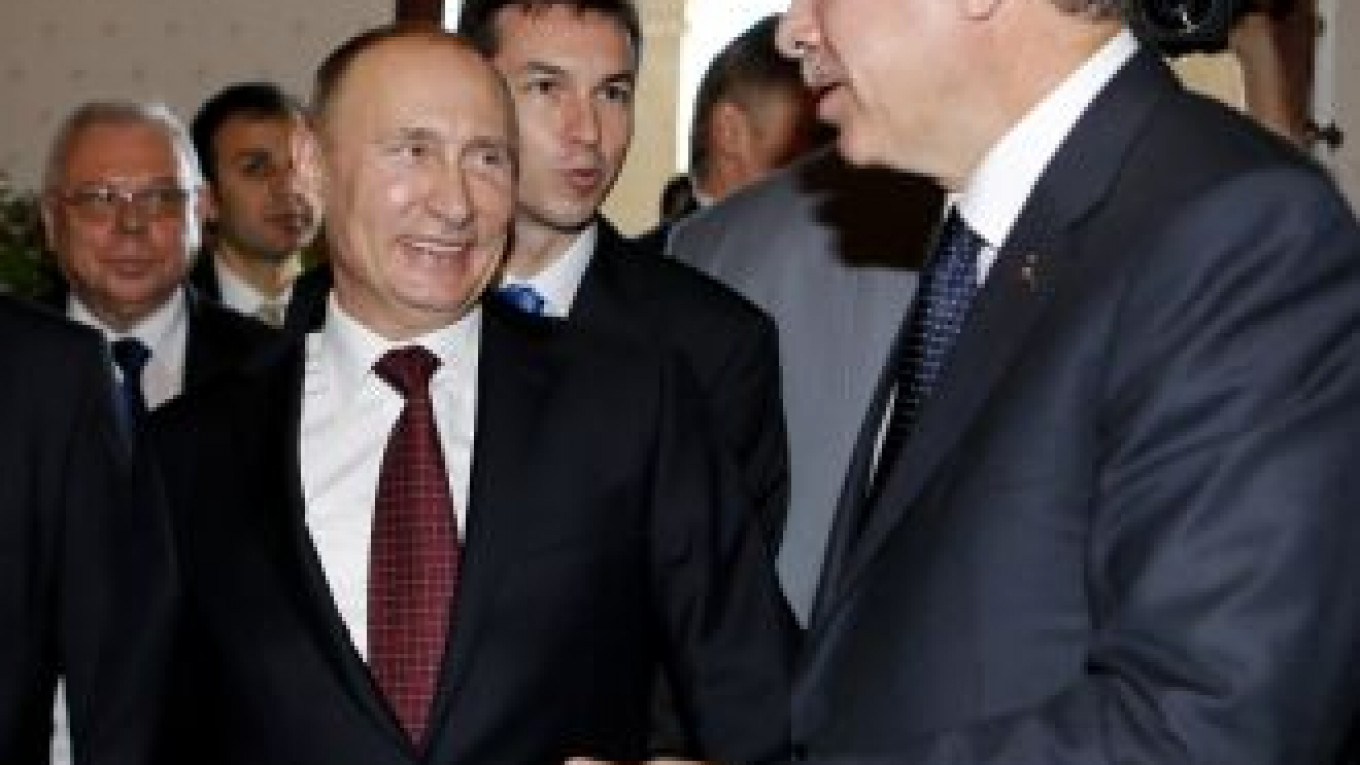President Vladimir Putin used his first known trip in almost two months to boost economic ties with Turkey and slam a NATO plan to place surface-to-air missiles on the Turkish-Syrian border.
The one-day visit to Istanbul also seemed to refute rumors that Putin is suffering from poor health. Speculation swirled after the Kremlin canceled a slew of foreign trips, including this one, in October and November.
Putin used the occasion to criticize a plan to use Patriot missiles to protect Turkey against airborne attacks from its war-torn neighbor Syria, such as a rocket strike that killed five in October.
Speaking at a news conference, Putin described that attack as an "accident" and said Syria is "obviously in no position to attack its neighbors," Interfax reported Monday.
Russia traditionally views foreign anti-missile batteries near its borders as a security threat, and Putin warned that the missiles could lead to escalating tensions between Turkey and Syria.
"You know, as they say, if there's a gun hanging on the wall at the beginning of the play, by the end it will absolutely be fired, and why do we need additional shots fired on the border?" he said.
NATO foreign ministers are expected to approve Turkey's request for the Patriot missile batteries at a meeting on Tuesday in Brussels.
NATO Secretary-General Anders Fogh Rasmussen dismissed Russian fears of an escalation.
"This is a solely defensive measure that will be de-escalating," he told reporters in Brussels. "The [missiles'] purpose is to ensure the effective protection of people on Turkish territory. … The essence of the alliance is to protect."
Some described Putin's visit to Turkey as a last-ditch attempt to derail the plan.
Alexander Shumilin, a Middle East expert at the Institute for U.S. and Canadian Studies, said Putin likely traveled to Istanbul with a serious proposal, possibly including the evacuation of Syrian President Bashar Assad to Russia in exchange for Turkey rejecting the missile plan.
"If Putin didn't have any proposals for influencing the situation in Syria, why would he go to discuss this question with Erdogan?" Shumilin said Monday by telephone, referring to Turkish Prime Minister Tayyip Erdogan.
There are "very persistent" rumors about Assad being evacuated to Moscow, he said. "This is one of those cases when the rumors have a strong foundation."
Russia has used its UN Security Council veto power to swat down calls for international sanctions on the Syrian government. It has also said it would honor existing weapons contracts.
But Putin denied that Russia was a "staunch defender" of the Syrian regime, saying the Russian government was worried about repeating "recent mistakes," a vague reference to Libya.
An estimated 40,000 Syrians have died since mass anti-government protests began in March 2011 and later evolved into a civil war.
Russia and Turkey will continue to discuss the Syrian conflict, Putin said, stressing that the two sides shared a concern for a growing humanitarian crisis in the country.
Putin's visit also saw the signing of 11 agreements on trade, energy, finance, banking and other issues.
Turkey and Russia's economic ties are growing rapidly, with bilateral trade of $32 billion last year, a figure Putin and Erdogan hoped would jump to $100 billion in a year.
Energy, construction and tourism are a lynchpin of the countries' bilateral ties. About 3.5 million Russians visited Turkey last year.
Putin is not known to have traveled since returning from an Oct. 5 visit to Tajikistan. The Kremlin subsequently canceled all visits planned for October and November, citing scheduling difficulties.
In Istanbul, he appeared somewhat rigid but showed no signs of obvious pain or discomfort, The Associated Press reported.
Staff reporter Nikolaus von Twickel contributed to this report from Brussels.
Related articles:
A Message from The Moscow Times:
Dear readers,
We are facing unprecedented challenges. Russia's Prosecutor General's Office has designated The Moscow Times as an "undesirable" organization, criminalizing our work and putting our staff at risk of prosecution. This follows our earlier unjust labeling as a "foreign agent."
These actions are direct attempts to silence independent journalism in Russia. The authorities claim our work "discredits the decisions of the Russian leadership." We see things differently: we strive to provide accurate, unbiased reporting on Russia.
We, the journalists of The Moscow Times, refuse to be silenced. But to continue our work, we need your help.
Your support, no matter how small, makes a world of difference. If you can, please support us monthly starting from just $2. It's quick to set up, and every contribution makes a significant impact.
By supporting The Moscow Times, you're defending open, independent journalism in the face of repression. Thank you for standing with us.
Remind me later.


